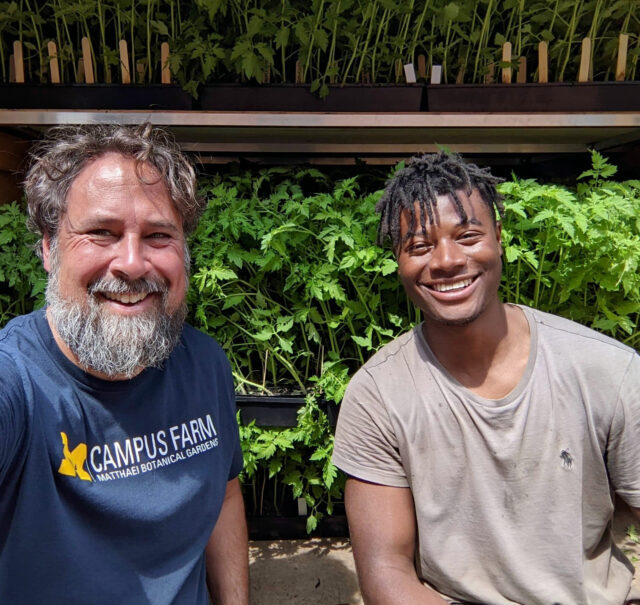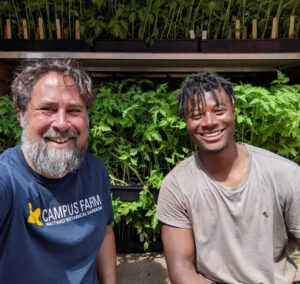Source: The University Record

Jeremy Moghtader, left, program manager for the Campus Farm, stands with Akello Karamoko, farm manager for Keep Growing Detroit. The Campus Farm grew 14,000 tomato transplants in collaboration with Keep Growing Detroit this past spring. (Photo by Jeremy Moghtader)

Jeremy Moghtader, left, program manager for the Campus Farm, stands with Akello Karamoko, farm manager for Keep Growing Detroit. The Campus Farm grew 14,000 tomato transplants in collaboration with Keep Growing Detroit this past spring. (Photo by Jeremy Moghtader)
If any students tell Jeremy Moghtader their dog ate their homework, he’s likely to understand.
He’d prefer, however, to hear that another student ate it instead.
As the program manager for the Campus Farm for the past six years, Moghtader is responsible for a farm where students plan, plant, grow and harvest fresh produce to sell to Michigan Dining, donate to the Maize & Blue Cupboard and offer for sale at the Farm Stand.
A living learning lab for sustainable food systems work built around principles of food grown by students for students, the Campus Farm at Matthaei Botanical Gardens is an ideal home for Moghtader.
His maternal grandparents owned and operated a sheep farm in Charlotte, Michigan, and though neither of his parents was a farmer, his future and passion appeared sealed on that farm.
“My dad is from Iran, grew up in a very urban environment in Tehran and moved here in his late 20s. My mom grew up on a farm but went to college and became a teacher and social worker,” he said.
“My grandparents’ farm was a working farm when I was a kid, and I think there’s no doubt about the fact that those experiences were fundamentally important to what I care about and what I do.”
Majoring in economics at U-M, Moghtader began taking more natural resources classes at what was then the School of Natural Resources and Environment. After obtaining his bachelor’s degree, he served in Americorps for a year in Washington state, and there was exposed to Evergreen State College’s instructional campus farm.
“It was a very inspiring place to see this blend of farming and education in an academic setting,” he said. “It lodged in my heart this idea of what I wanted to do with my life.”
He then went to graduate school at the School for Environment and Sustainability to further explore his interest in the ecology of agricultural systems.
Moghtader spent 12 years as farm manager and director of programs for Michigan State University’s Student Organic Farm, where he helped launch an organic farmer training program.
During that time he remained in Ann Arbor, helping found several local food systems-related organizations, so when the opportunity arose to become the first program manager of the Campus Farm he was excited about the opportunities it presented and the decision to come was easy.
“My work in food systems and food production started to blossom when I was in graduate school (at SEAS) and trying to think about and understand how food systems sit at this nexus between how we as a species gain our sustenance and what the impacts of those systems are on human health, the health of the environment and our economic systems,” he said.
“Food systems are intersectional with these core questions as a society and a species for how we sustain ourselves now and in the future. That’s a strong anchor point for me moving forward.”
The Campus Farm is an ideal playground. One of the first successes for Moghtader was helping the students navigate the application process for and obtain a U.S. Department of Agriculture Good Agricultural Practices food safety certification.
That opened the door to a strong partnership selling Campus Farm-grown produce to Michigan Dining and, in Moghtader’s words, “really kickstarted the conveyer belt allowing students to accomplish their founding vision of growing food for other students and to invest the revenue from that into growing even more food for more students.”
Moghtader said the work is year-round. The Campus Farm has four passive-solar hoop houses totaling about 12,000 square feet that allow for the growth of spinach, arugula, kale, and early and late-season lettuce through the winter.
It also grows all the vegetable, flower and herb transplants for the Matthaei-Nichols Kitchen Favorites Plant Sale, where people can get plant starts for their own gardens. In addition, this past spring the farm grew 14,000 tomato transplants in collaboration with Keep Growing Detroit for distribution in that organization’s Garden Resource Program that supports over 2,000 urban and community gardens in the city.
But the busiest time is approaching, if it’s not already upon Moghtader and the farm.
“We have eight weeks of really nice outdoor weather that you can count on in any academic year. So as a primarily outdoor farm, a lot of action gets packed into those weeks,” he said. “The crop plan is structured to maximize food availability when Dining has the most eaters and the Farm Stand has the most customers, so we try to create this tidal wave of produce around now and that stays at a pretty high output until the snow flies.”
Moghtader practices his craft at home, too, and ramped that up during the COVID-19 pandemic. He said he and his family planted blueberries, blackberries and raspberries, adding more perennials to the fruit trees they already had.
“There’s a pure joy that happens in the yard when my kids are picking abundant raspberries off these plants we planted together or harvesting winter squash,” he said. “That brings all this genuine joy. There’s real power in that participation in the food system as not just an eater but as a producer and an eater that I think is also true at the Campus Farm.”
When not tending to their garden, Moghtader and his family enjoy taking backpacking trips around the Great Lakes, especially Lake Michigan.
“My whole family really values and appreciates the amazing and incredible gem that these huge bodies of freshwater and their adjacent ecosystems provide,” he said. “It’s a literally wondrous place.”
While growing produce and fostering student leadership are at the heart of his position with the Campus Farm, Moghtader also is motivated by a deeper passion.
“One of my strongest interests is social, economic and racial justice. Food touches on those things in such a strong way,” he said. “There is no sustainability without equity and justice. Everyone wants and deserves access to good, healthy, sustainable food, and the means to acquire it.”

